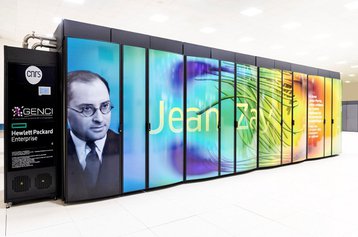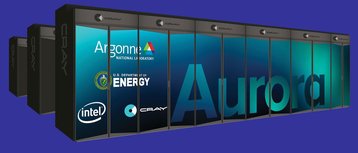The European Commission is to procure a second exascale-class supercomputer and locate it in France.
The European High-Performance Computing Joint Undertaking (EuroHPC JU) has selected the Jules Verne consortium to host & operate in France the EU agency’s second exascale supercomputer.
Euro-HPC said the new exascale supercomputer will be managed by GENCI, the French national agency for High-Performance Computing. It will be located at the TGCC computing center owned by the CEA (the French Alternative Energies and Atomic Energy Commission) in Bruyères-le-Châtel, southwest of Paris.
Philippe Lavoca, CEO of GENCI, said: “One billion billion of operations per second to accelerate the advent of the future. GENCI is delighted and proud with EuroHPC's announcement that the Franco-Dutch Jules Verne consortium has been selected to host and operate an Exascale-class supercomputer.”
François Jacq, CEA chairman added: “This supercomputer will be an exceptional instrument for European research at the service of European society and sovereignty. It will enable major advances in many fields that are at the heart of CEA's research activities, such as high-resolution climate modeling, fusion for energy, innovative materials, human digital twins, and personalized medicine. The CEA has a long experience of designing and implementing pre-exascale supercomputers in state-of-the-art computing centers. We will put all our expertise in the design and operation of computing centers at the service of this project, with the objective of performance and control of energy consumption.”
The Jules Verne consortium will be led by France through GENCI and supported by CEA, with the participation of the Netherlands through Surf, a cooperative association of Dutch educational and research institutions.
Jet de Ranitz, CEO of Surf, added: “We are proud to be working together in the Jules Verne consortium to significantly advance research on societal challenges. This supercomputer will further help Dutch researchers carry out complex simulations in fields ranging from climate science and engineering to medicine and astronomy.”
The project will have a budget of €542 million ($588.3m), with EuroHPC contributing up to 50 percent. It is scheduled for delivery in 2025. €8 million ($8.7m) will be provided by the Dutch Ministry of Culture, Education and Science; and €263 million ($285.5m) will be provided by the French government.
The TGCC currently houses the 22 petaflops Joliot-Curie supercomputer, an Atos Bull system installed in 2019. The company previously installed a 1.4 petaflops Bull system called Cobalt in 2016.
Europe’s first exascale supercomputer is to be located in Forschungszentrum Jülich facilities in Germany. EuroHPC selected the research institution's Gauss Center for Supercomputing in Jülich to host the future machine, to be named Jupiter, in June 2022.
Jupiter will be installed in a purpose-built building on the campus of Forschungszentrum Jülich from 2023.
Vendors for Jupiter or the new French system haven’t been named yet.
The 1.194 exaflops Frontier system, located at the Department of Energy’s Oak Ridge National Laboratory in Tennessee is currently the No. 1 system on the most recent Top500 list of most powerful supercomputers. It is currently the only Exascale system on the list, though more are set to join in the coming months and years.
Installation work on the 2 exaflops Aurora supercomputer was recently completed at the Argonne National Laboratory in Illinois. The upcoming El Capital is also set to offer 2 exaflops when it launches at the Lawrence Livermore National Laboratory in California later this year. NERSC-10, set to launch in 2026, could offer as many as 40 exaflops.
The UK also hopes to procure its own exaflops supercomputer soon. India is planning to deploy its own exascale system using home-grown processors; Param-Shankhis is set to launch in 2024.
China has reportedly developed at least two exascale supercomputers already, with plans for up to 10 exascale HPCs by 2025. The country has not publicly released the specifications of the supercomputers, but the two in operation are both thought to be below 2 exaflops.








